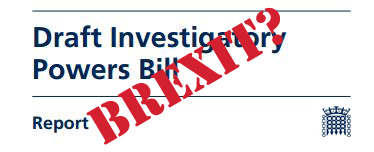 The Investigatory Powers Bill is currently proceeding through parliament – its second reading in the House of Lords took place on Monday 27 June.
The Investigatory Powers Bill is currently proceeding through parliament – its second reading in the House of Lords took place on Monday 27 June.
Readers may have missed reports on the Lords debate amidst financial losses, Labour Party resignations, the Conservative Party leadership race and, of course, England’s embarrassing exit from Euro 2016 (among other things).
Given the ongoing political uncertainty and distractions after the Brexit vote, Open Rights Group campaigners have called on the government to halt the passage of the Bill on the basis that it cannot be adequately scrutinised by parliamentarians, the media and the public.
The Open Rights Group suggests that the passage of the Bill could be affected by the political crisis – the Bill could be accelerated or delayed depending on whether a General Election is called.
Ongoing legal cases may also affect its passage – particularly the impending European Court of Justice ruling on a case brought by MPs Tom Watson and David Davis in relation to the Data Retention and Investigatory Powers Act (DRIPA). In the Lords debate, Lord Butler described the DRIPA ruling as “hanging over the whole issue”.
Elements of DRIPA – emergency legislation passed in 2014 – have been included in the Investigatory Powers Bill. If the ECJ upholds a decision by the High Court in July 2015 that the sections on self-authorised access and bulk retention of data breach fundamental EU Charter rights under Articles 7 and 8, then this could have a significant impact on the IP Bill.
It is likely that any temptation to ignore ECJ rulings relevant to the IP Bill (and more generally) in light of the leave vote will be resisted as any failure to comply with current EU treaty obligations could possibly provide a pretext for greater EU action against the UK to speed up Brexit. Although there is no mechanism to formally expel the UK from the EU, indirect action could be explored which might put pressure on the UK’s control of the exit process through Article 50.
In the Lords debate, there was disagreement over the impact of the leave vote on the Bill. Lord Rosser noted that the vote to leave the EU had “added to the complexity” of the Bill due to uncertainties over European cooperation on security issues, but the Advocate General for Scotland, Lord Keen of Elie did not believe that any changes to the Bill would be required in light of the Brexit vote.
For the time being, the Bill continues its path to Royal Assent – the House of Lords committee stage is due to begin on 11 July.
